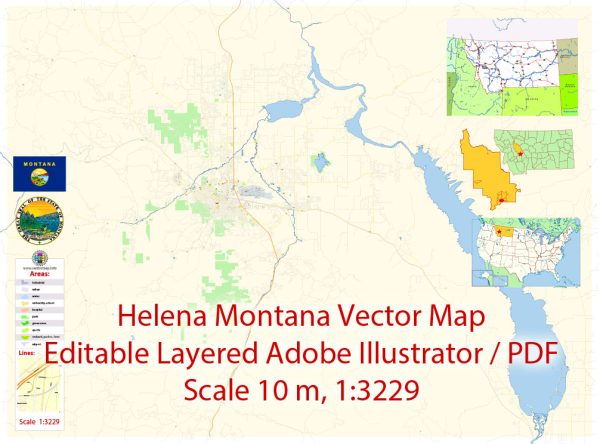Helena, Montana is the capital city of the state of Montana, USA. It has a rich history that is closely tied to the development of the American West. Here is a brief description of Helena’s history:
- Native American Presence: Before European settlement, the area around Helena was inhabited by various Native American tribes, including the Salish, Shoshone, and Blackfeet. They relied on the region’s abundant natural resources, including the Missouri River and its tributaries, for sustenance.
- Gold Rush Era: Helena’s history is closely connected to the Montana Gold Rush of the 1860s. Gold was discovered in the nearby Last Chance Gulch (now part of downtown Helena) in 1864, leading to a rapid influx of prospectors and settlers. The town of Helena was founded in 1864, and it quickly became a center for gold mining and trade. The gold rush attracted people from all over the United States and beyond, leading to a diverse and thriving community.
- Territorial Capital: Helena became the territorial capital of Montana in 1875 and later the state capital when Montana achieved statehood in 1889. The city’s status as the capital contributed to its growth and development.
- Economic and Cultural Hub: Helena continued to thrive as a center of commerce and culture in Montana. The city’s prosperity was based not only on gold mining but also on other industries like agriculture, timber, and government services.
- Architectural Heritage: Many historic buildings from the late 19th and early 20th centuries still stand in Helena, showcasing various architectural styles, including Victorian and Gothic Revival. Notable landmarks include the Montana State Capitol, St. Helena Cathedral, and the Original Governor’s Mansion.
- Decline and Rebirth: As gold mining declined in the late 19th century, Helena faced economic challenges. However, the city reinvented itself with the growth of government jobs, particularly in the wake of World War II, as well as the expansion of tourism and outdoor recreation in the nearby Rocky Mountains.
- Cultural Attractions: Helena is known for its cultural attractions, including museums, art galleries, and performing arts venues. The city celebrates its history with events like the Last Chance Stampede and Fair.
- Outdoor Recreation: The surrounding area offers abundant opportunities for outdoor enthusiasts, with hiking, fishing, and other recreational activities in the nearby Helena National Forest and the Gates of the Mountains Wilderness.
Helena, Montana, is a city with a rich and diverse history, deeply rooted in the American West’s frontier spirit and resourceful development. Today, it remains the political and cultural center of Montana, offering a blend of historical charm and modern amenities.


 Author: Kirill Shrayber, Ph.D. FRGS
Author: Kirill Shrayber, Ph.D. FRGS